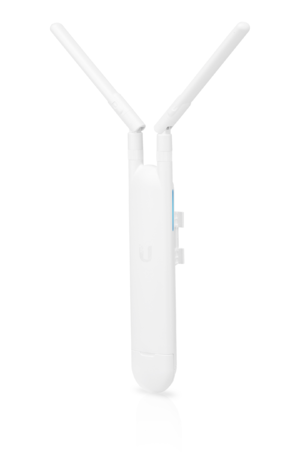Difference between revisions of "Ubiquiti UAP AC Mesh"
(Add link to the firmware.) |
Stephen304 (talk | contribs) |
||
| Line 1: | Line 1: | ||
| + | [[Category:Devices]] | ||
[[Category:Ubiquiti]] | [[Category:Ubiquiti]] | ||
[[File:Ubnt-uap-ac-m.png|thumb|UAP AC Mesh]] | [[File:Ubnt-uap-ac-m.png|thumb|UAP AC Mesh]] | ||
Revision as of 19:27, 4 January 2020
The UAP AC Mesh is a PoE powered access point that is weather resistant and omnidirectional.
Downgrading
If your device shipped with the latest firmware, or if you upgraded to version 3.8.xx.xxxx or higher, you may need to downgrade the device before you can flash it due to the mtd utility being missing in later versions. Simply download any 3.7.xx.xxxx firmware image from the Ubiquiti Downloads Page and proceed with the recovery instructions.
Aparcar's meta-imagebuilder
First clone the repo from opensource.piratemesh.net (hyperboria or yggdrasil-network) or from https://github.com/MassMesh/meta-imagebuilder Once checked out of the repo, call the massmesh script with these parameters `./build massmesh meshradio ubnt_unifiac-mesh` The mesh firmware is built in /dev/shm (tmpfs) but the imagebuilder variable can be changed, please use the `build` script as you see fit.
Compiling for LiMe
Clone the Libremesh source code with git clone https://github.com/libremesh/lime-sdk.git
If stuck, detailed information can be found here: (https://libremesh.org/getit.html)[1]
The following steps should produce the `sysupgrade` firmware.
./cooker -d ar71xx/generic ./cooker -b ar71xx/generic ./cooker -c ar71xx/generic --flavor=lime_default --profile=ubnt-unifiac-lite --community=massmesh/common
The filename of the sysupgrade firmware may change. The examples below may differ than the binary produced from the steps above.
In the case you are building the latest development firmware, the output directory may generate a firmware named
openwrt-18.06.1-massmesh-common-ar71xx-generic-ubnt-unifiac-mesh-squashfs-sysupgrade.bin
Flashing
Get the firmware here.
In the stock firmware, the access point will have the default user/pass ubnt / ubnt. If there is no DHCP server, it will assign itself the IP address 192.168.1.20.
- Statically assign your computer the IP address
192.168.1.25 - Power on the device and plug it into your computer's ethernet port
- Copy the firmware you want to flash to the device:
- SSH into the device and log in with the default username and password
ubnt / ubnt - Then write the firmware to
kernel0andkernel1
scp openwrt-ar71xx-generic-ubnt-unifiac-lite-squashfs-sysupgrade.bin ubnt@192.168.1.20:/tmp/
ssh ubnt@192.168.1.20
BZ.v3.7.40# mtd write /tmp/openwrt-ar71xx-generic-ubnt-unifiac-lite-squashfs-sysupgrade.bin kernel0 Unlocking kernel0 ... Erasing kernel0 ... Writing from /tmp/openwrt-ar71xx-generic-ubnt-unifiac-lite-squashfs-sysupgrade.bin to kernel0 ... [e/w] BZ.v3.7.40# mtd -r write /tmp/openwrt-ar71xx-generic-ubnt-unifiac-lite-squashfs-sysupgrade.bin kernel1 Unlocking kernel1 ... Erasing kernel1 ... Writing from /tmp/openwrt-ar71xx-generic-ubnt-unifiac-lite-squashfs-sysupgrade.bin to kernel1 ... [e/w]
After writing the firmware and giving the radio a reboot please wait upwards of 5+ minutes during this "first boot" process. Soon you'll be able to access to device over WiFi (or Ethernet) in order to set a new admin password here: http://thisnode.info
Recovery
To recover the UAP AC Mesh from a bad flash, or to upgrade or downgrade the stock firmware, you will need to put the device in recovery mode and send a stock firmware using TFTP.
- Obtain a stock firmware to flash by going to the Ubiquiti Downloads Page for this device and clicking "See Past Firmware" -
3.7.xx.xxxxis recommended if you wish to flash something else afterwards - Rename the firmware file to
firmware.bin, as the device will look for this file name - To enter recovery mode, hold the reset button located next to the ethernet port while plugging in the power. Hold the reset button until the side LED alternates orange, blue, off.
- Assign your computer a static IP such as
192.168.1.25, with net mask of255.255.255.0or/24 - Connect your computer's ethernet port to the device
- Run TFTP and enter the following commands:
tftp> connect 192.168.1.20 tftp> binary tftp> rexmt 1 tftp> timeout 60 tftp> put firmware.bin Sent x bytes in x seconds
The LED will flash at varying speeds, then it will turn solid when complete.
